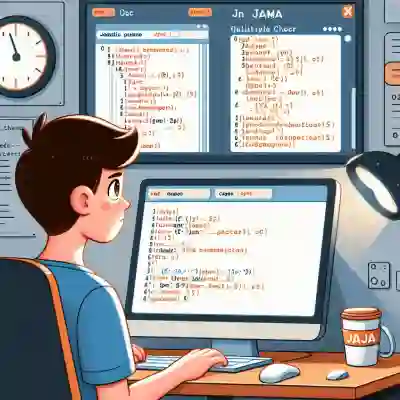
Top 100 Java MCQ Online Test with Answers
This blog provides a test featuring the top 50 Java MCQ online for exam preparation and practice. Every Java MCQ online test is crucial for placements, exams, and competitions. The Java MCQ Online Test with Answers aims to thoroughly test and improve your grasp of Java concepts. Begin your exploration today and elevate your Java skills to new levels!
The Ultimate Top 100 JAVA MCQ Online Test with Answers
Enhance your Java skills with ease using our Top 100 JAVA MCQ Online Test. Explore straightforward questions and answers crafted to deepen your grasp of Java programming. Embark on the Java MCQ online test now and advance in your Java expertise!
Basic Java MCQ Online Test – Introduction Quiz
This blog will discuss a Basic Java MCQ Online Test quiz with answers, covering topics such as Introduction, Variables, Data Types, History, Compiler, and more. every MCQ provide answers along with explanations.
Question 1:
Which of the following statements about JVM (Java Virtual Machine) is true?
a) JVM physically exists as a hardware component.
b) JVM is responsible for compiling Java source code.
c) JVM executes Java bytecode and provides a runtime environment.
d) JVM is platform-independent and does not require any specific configuration for different operating systems.
Answer:
c) JVM executes Java bytecode and provides a runtime environment.
Explanation:
JVM is an abstract machine that executes Java bytecode and provides a runtime environment for Java applications to run efficiently.
Question 2:
What is the purpose of JRE (Java Runtime Environment)?
a) To develop Java applications and applets
b) To execute Java bytecode and provide a runtime environment
c) To generate Java documentation
d) To compile Java source code
Answer:
b) To execute Java bytecode and provide a runtime environment
Explanation:
JRE is the implementation of JVM and is responsible for executing Java bytecode and providing the necessary runtime environment for Java applications to run.
Question 3:
Which components does JDK (Java Development Kit) contain?
a) Only JRE
b) Only JVM
c) JRE and development tools
d) JVM and documentation generator
Answer:
c) JRE and development tools
Explanation:
JDK contains JRE along with development tools such as a compiler, archiver, and documentation generator, essential for developing Java applications.
Question 4:
What makes Java platform-independent despite JVM, JRE, and JDK being platform-dependent?
a) JVM can run Java bytecode on any hardware and software platform.
b) JRE contains a set of libraries that ensure platform independence.
c) JDK includes a private Java Virtual Machine for each platform.
d) JVM, JRE, and JDK are all built to adapt to different operating systems.
Answer:
a) JVM can run Java bytecode on any hardware and software platform.
Explanation:
Java bytecode, once compiled, can be executed by JVM on any hardware and software platform, making Java applications platform-independent.
Question 5:
What is a variable in Java?
a) A reserved area in memory that cannot be changed
b) A container for holding data types
c) A static location in memory
d) A combination of “vary + able” indicating its value can change
Answer:
d) A combination of “vary + able” indicating its value can change
Explanation:
A variable in Java is a name given to a reserved area in memory that can hold values, and the term “variable” signifies that its value can vary or change during program execution.
Question 6:
Which type of variable can only be used within the method it is declared in?
a) Instance variable
b) Static variable
c) Local variable
d) Primitive variable
Answer:
c) Local variable
Explanation:
A local variable is declared inside the body of a method and can only be accessed within that method. Other methods in the class are not aware of its existence.
Question 7:
What is an instance variable in Java?
a) A variable declared inside a method
b) A variable declared as static
c) A variable shared among all instances of a class
d) A variable declared outside the body of a method, but inside the class
Answer:
d) A variable declared outside the body of a method, but inside the class
Explanation:
An instance variable is declared inside the class but outside the body of any method. It is not declared as static and holds instance-specific values.
Question 8:
Which type of variable can be shared among all instances of a class?
a) Local variable
b) Instance variable
c) Static variable
d) Primitive variable
Answer:
c) Static variable
Explanation:
A static variable is declared with the “static” keyword and is shared among all instances of the class. Memory for static variables is allocated only once when the class is loaded into memory.
Top 10 MCQ questions and answers on Java operators:

Welcome to our comprehensive guide on Java operators! This section of the Java MCQ Online Test will discuss related Operator MCQs in Java with Answers. Get a grasp on Java operators effortlessly with our top java MCQ online test blog! Simplify your understanding of arithmetic, bitwise, and logical operators in Java programming. Dive in and boost your confidence with our straightforward guide!
Operator Java Quiz
Question 1:
What are operators in Java?
a) Special symbols that declare variables
b) Keywords used to define functions
c) Special symbols that perform specific operations on operands
d) Reserved words for defining classes
Answer:
c) Special symbols that perform specific operations on operands
Explanation:
Operators in Java are special symbols that perform specific operations on one, two, or three operands and return a result.
Question 2:
How are operators listed in terms of precedence?
a) Alphabetical order
b) Random order
c) Based on their appearance in the Java language
d) Based on precedence order
Answer:
d) Based on precedence order
Explanation:
Operators are listed in the order of their precedence, with those appearing closer to the top having higher precedence. Operators with higher precedence are evaluated before those with relatively lower precedence.
Question 3:
Which operator has the highest precedence?
a) Logical OR (||)
b) Unary postfix operators (++expr, –expr)
c) Relational operators (<, >, <=, >=, instanceof)
d) Multiplicative operators (*, /, %)
Answer:
b) Unary postfix operators (++expr, –expr)
Explanation:
Unary postfix operators have the highest precedence among the listed operators.
Question 4:
How are binary operators evaluated in Java?
a) From right to left
b) From left to right
c) Randomly
d) Based on the associativity rule
Answer:
b) From left to right
Explanation:
All binary operators except assignment operators are evaluated from left to right in Java.
Question 5:
What does the unary bitwise complement operator “~” do in Java?
a) Performs a bitwise AND operation
b) Inverts a bit pattern, changing every “0” to “1” and every “1” to “0”
c) Performs a bitwise exclusive OR operation
d) Shifts a bit pattern to the left
Answer:
b) Inverts a bit pattern, changing every “0” to “1” and every “1” to “0”
Explanation:
The unary bitwise complement operator “~” inverts a bit pattern, changing every “0” to “1” and every “1” to “0”.
Question 6:
What does the signed left shift operator “<<” do in Java?
a) Shifts a bit pattern to the left
b) Shifts a bit pattern to the right
c) Performs a bitwise AND operation
d) Performs a bitwise exclusive OR operation
Answer:
a) Shifts a bit pattern to the left
Explanation:
The signed left shift operator “<<” shifts a bit pattern to the left by the number of positions specified by the right-hand operand.
Question 7:
Which operator performs a bitwise AND operation in Java?
a) &
b) ^
c) |
d) <<<
Answer:
a) &
Explanation:
The bitwise & operator performs a bitwise AND operation in Java.
Question 8:
What does the unsigned right shift operator “>>>” do in Java?
a) Shifts a zero into the leftmost position
b) Shifts a bit pattern to the left
c) Shifts a bit pattern to the right
d) Depends on sign extension
Answer:
a) Shifts a zero into the leftmost position
Explanation:
The unsigned right shift operator “>>>” shifts a zero into the leftmost position, while the leftmost position after “>>” depends on sign extension.
Java Control Statement: Java MCQ Online Test Quiz with Answers
Test your Java MCQ Online test skills with our comprehensive online quiz featuring multiple-choice questions on control statements. Explore various scenarios, enhance your understanding, and check your knowledge of Java’s control structures. Find detailed explanations for each question. Take the Java MCQ online test now!

Control Statement Java Quiz
Q. 1 Which type of statement in Java allows the program to execute different actions based on specific conditions?
A) Iteration Statements
B) Selection Statements
C) Jump Statements
D) Declaration Statements
Answer: B) Selection Statements
Explanation: Selection statements in Java, such as if-else and switch statements, enable the program to choose actions based on specific conditions. They evaluate Boolean expressions and execute different code blocks accordingly.
Q. What is the purpose of a one-way if statement in Java?
A) It executes an action only if the specified condition is false.
B) It executes an action only if the specified condition is true.
C) It executes multiple actions sequentially.
D) It executes actions based on user input.
Answer: B) It executes an action only if the specified condition is true.
Explanation: A one-way if statement in Java executes a specific action only if the condition provided evaluates to true. If the condition is false, the action within the if statement is skipped.
Q.3 In Java, which statement allows for nested conditions, forming multiple layers of decision-making?
A) Iteration Statement
B) Switch Statement
C) Selection Statement
D) Jump Statement
Answer: C) Selection Statement
Explanation: Selection statements in Java, particularly if statements, allow for nested conditions where one if statement can be placed inside another. This enables multiple layers of decision-making based on various conditions.
Q. 4 What is the role of logical operators in Java selection statements?
A) They combine conditions to form complex Boolean expressions.
B) They convert Boolean expressions to numerical values.
C) They determine the order of execution of statements.
D) They control the flow of the program based on user input.
Answer: A) They combine conditions to form complex Boolean expressions.
Explanation: Logical operators in Java, such as && (logical AND), || (logical OR), and ! (logical NOT), are used to combine multiple conditions to form complex Boolean expressions within selection statements.
Q.5 Which operator in Java enables you to assign values to variables based on conditions, offering a concise alternative to if-else statements?
A) Logical Operator
B) Relational Operator
C) Conditional Operator
D) Assignment Operator
Answer: C) Conditional Operator
Explanation: The conditional operator (also known as the ternary operator) in Java allows for conditional assignment of values to variables based on Boolean expressions. It provides a concise alternative to if-else statements for simple conditional assignments.
Question 6:
Which category of statements in Java allows for breaking up the flow of execution by employing decision making, looping, and branching?
a) Data manipulation statements
b) Control flow statements
c) Exception handling statements
d) Input/output statements
Answer:
b) Control flow statements
Explanation:
Control flow statements in Java allow for breaking up the flow of execution by employing decision making, looping, and branching, enabling conditional execution of particular blocks of code.
Question 7:
Which type of statement in Java is used for conditionally executing particular blocks of code?
a) Data manipulation statements
b) Control flow statements
c) Exception handling statements
d) Input/output statements
Answer:
b) Control flow statements
Explanation:
Control flow statements, such as if-then, if-then-else, switch, allow for conditionally executing particular blocks of code based on specified conditions.
Java oops MCQ Test Online answer with explanation
Master Java Object-Oriented Programming (OOP) concepts with our online quiz! Explore a variety of multiple-choice questions covering inheritance, polymorphism, encapsulation, and more. Take our Java MCQ online test now and boost your OOP skills!

Java MCQ Online test here 20 multiple-choice questions with answers and explanations based OOPs.
OOPs Java Online MCQ Test
1) Which programming paradigm provides concepts such as inheritance, data binding, and polymorphism?
A) Procedural programming
B) Object-Oriented programming
C) Functional programming
D) Declarative programming
Answer: B) Object-Oriented programming
Explanation: Object-Oriented programming (OOP) provides concepts such as inheritance, data binding, and polymorphism, which are not typically found in procedural or functional programming paradigms.
2) What is considered as the first object-oriented programming language?
A) C++
B) Java
C) Simula
D) Smalltalk
Answer: C) Simula
Explanation: Simula is considered as the first object-oriented programming language.
3) Which programming paradigm represents everything as an object?
A) Imperative programming
B) Functional programming
C) Procedural programming
D) Object-oriented programming
Answer: D) Object-oriented programming
Explanation: In object-oriented programming, everything is represented as an object.
4) What is the definition of an object in Object-Oriented Programming?
A) Any entity with state and behavior
B) A variable
C) A function
D) A conditional statement
Answer: A) Any entity with state and behavior
Explanation: An object in OOP is any entity that has both state and behavior.
5) What is a class in Object-Oriented Programming?
A) A collection of objects
B) A function
C) A template for creating objects
D) A variable
Answer: C) A template for creating objects
Explanation: A class in OOP serves as a template for creating objects.
6) What is inheritance in Object-Oriented Programming?
A) The process of hiding internal details
B) The process of representing everything as an object
C) The process of acquiring properties and behaviors from a parent object
D) The process of binding code and data together
Answer: C) The process of acquiring properties and behaviors from a parent object
Explanation: Inheritance in OOP refers to the process where one object acquires all the properties and behaviors of the parent object.
7) Which programming concept is used to achieve code reusability in Object-Oriented Programming?
A) Inheritance
B) Encapsulation
C) Polymorphism
D) Abstraction
Answer: A) Inheritance
Explanation: Inheritance allows for code reusability by enabling one class to inherit properties and behaviors from another class.
8) What is polymorphism in Object-Oriented Programming?
A) The process of representing everything as an object
B) The process of hiding internal details
C) The process of performing one task in different ways
D) The process of binding code and data together
Answer: C) The process of performing one task in different ways
Explanation: Polymorphism allows for one task to be performed in different ways.
9) In Java, which mechanisms are used to achieve polymorphism?
A) Inheritance
B) Encapsulation
C) Method overloading and method overriding
D) Abstract class and interface
Answer: C) Method overloading and method overriding
Explanation: In Java, polymorphism is achieved using method overloading and method overriding.
10) What is abstraction in Object-Oriented Programming?
A) The process of hiding internal details
B) The process of representing everything as an object
C) The process of acquiring properties and behaviors from a parent object
D) The process of binding code and data together
Answer: A) The process of hiding internal details
Explanation: Abstraction in OOP involves hiding internal details and showing only the functionality.
11) Which mechanism is used in Java to achieve abstraction?
A) Inheritance
B) Encapsulation
C) Method overloading
D) Abstract class and interface
Answer: D) Abstract class and interface
Explanation: In Java, abstraction is achieved using abstract classes and interfaces.
12) What is encapsulation in Object-Oriented Programming?
A) The process of representing everything as an object
B) The process of acquiring properties and behaviors from a parent object
C) The process of hiding internal details
D) The process of performing one task in different ways
Answer: C) The process of hiding internal details
Explanation: Encapsulation involves binding code and data together into a single unit and hiding internal details.
13) Which programming concept is used to achieve data hiding in Object-Oriented Programming?
A) Inheritance
B) Encapsulation
C) Polymorphism
D) Abstraction
Answer: B) Encapsulation
Explanation: Encapsulation in OOP helps in achieving data hiding by wrapping code and data into a single unit.
14) What is one of the key benefits of inheritance in Object-Oriented Programming?
A) Code duplication
B) Reduced flexibility
C) Code reusability
D) Increased complexity
Answer: C) Code reusability
Explanation: One of the key benefits of inheritance is code reusability, as common code can be shared amongst several subclasses.
15) What does the ‘final’ keyword indicate in Java?
A) That the variable can be changed after declaration
B) That the variable cannot be changed after declaration
C) That the variable is static
D) That the variable is public
Answer: B) That the variable cannot be changed after declaration
Explanation: In Java, the ‘final’ keyword indicates that a variable’s value cannot be changed after declaration.
16) Which type of comment in Java is used to create documentation API?
A) Single Line Comment
B) Multi Line Comment
C) Documentation Comment
D) JavaDoc Comment
Answer: C) Documentation Comment
Explanation: Documentation comments in Java are used to create documentation API using the JavaDoc tool.
17) What are the two types of data types in Java?
A) Primitive and non-primitive
B) Integer and float
C) Boolean and string
D) Static and dynamic
Answer: A) Primitive and non-primitive
Explanation: In Java, there are two types of data types: primitive and non-primitive.
18) What is the default size of a boolean data type in Java?
A) 1 bit
B) 2 bytes
C) 4 bytes
D) 8 bytes
Answer: A) 1 bit
Explanation: The default size of a boolean data type in Java is 1 bit.
19) Which Java version is the current stable release as of the provided text?
A) Java SE 7
B) Java SE 8
C) Java SE 9
D) Java SE 10
Answer: B) Java SE 8
Explanation: As of the provided text, the current stable release of Java is Java SE 8.
20) What keyword is used to declare a global constant in Java?
A) constant
B) static
C) final
D) var
**
Answer: C) final**
Explanation: The ‘final’ keyword is used to declare a global constant in Java.
These questions cover various concepts related to Object-Oriented Programming, Java, and programming paradigms.
some other source learning Java Programming MCQ
For learning Java Programming through multiple-choice questions, you can explore resources.

2 thoughts on “JAVA MCQ Online Test, Exam, Quiz, and Practice Top 100+”